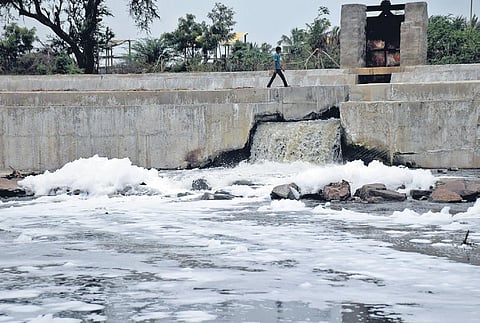

COIMBATORE: It was sheer desperation that pushed a group of farmers from Tirupur and Erode approach the Madras High Court in 2013, seeking to curtail the flow of Noyyal water through their villages. Reason? The river, a tributary of Cauvery and once a great nurturer of life, had turned into an effluent carrier that reportedly turns even the groundwater toxic.
Originating from the sacred heights of the Vellingiri Hills in Coimbatore, Noyyal meanders through western Tamil Nadu, offering its water to the masses of Coimbatore, Tiruppur, Erode, and Karur before its confluence with Cauvery.
Old-timers in these districts said the river is a seasonal one, with peak flow during the monsoon. Over the past many years, however, Noyyal seems to have turned into a ‘perennial’ river, only that its flow mostly contains untreated effluent and sewage from dyeing units and local bodies in Coimbatore and Tirupur, sources said.
“Groundwater near Orathupalayam check dam on the river stretch was found with over 7,500 TDS (Total Dissolved Solids). High levels of chemicals dissolved in the water ruined almost 500 acres; all this because of the effluent discharge from Coimbatore and Tirupur. So, a group of farmers here moved the High Court in 2013 to prevent the entry of water from the Noyyal channel into their areas,” said C Nallasami, Secretary of Federation of Tamil Nadu Agriculturalists Association.
Esan Murugasami of the Tamil Nadu Farmers Protection Association in Tirupur and Erode said: “There is no proper mechanism to monitor the zero-discharge-system by dyeing units in Tiruppur. Because of this, around 20,000 acres of arable land in Tiruppur, Erode, and Karur districts have turned barren. The effluent also pollutes the Cauvery, which is a major source of drinking water for many districts.” But, A Eswaran, former president of Tamil Nadu Science Forum (Tirupur) differs. “Effluent discharge, mainly from garment units, is falling since 2013 because of government mitigation efforts. Nevertheless, discharge of sewage by local bodies, mainly from Coimbatore, Tirupur, and Sulur, continues.”
R Manikandan, the coordinator of Kovai Kulangal Pathukappu Amaippu, said: “To rejuvenate Noyyal, the previous government had allocated Rs 230 crore in May 2020. The plan, however, focussed on strengthening bunds, not preventing effluent discharge. Coimbatore City Municipal Corporation (CCMC) is a major source of effluent to the river.”
To this, CCMC Commissioner Raja Gopal Sunkara responded: “Providing connections of underground drainage to houses in the city is yet to be completed. To prevent sewage discharge into the river, we have operationalised two sewage treatment plants in the city. We are working on another to treat sewage from areas added to the corporation. The completion will take some time.”
PK Selvaraj, President of Kaushika Neer Karangal said that Noyyal cannot be revived if local bodies do not treat their sewage. When contacted, P Thirumurthi, Executive Engineer of Water Resources Organisation of PWD said: “Almost 85% work of the rejuvenation project has been completed. Yes, the project did not include provisions to prevent the discharge of sewage by local bodies and effluent by industries. The present government, however, has asked us to submit a detailed plan report to address effluent discharge to Noyyal.”
Ahead of the World Rivers Day on September 26, TNIE looks at the problems plaguing the rivers flowing through Tamil Nadu.